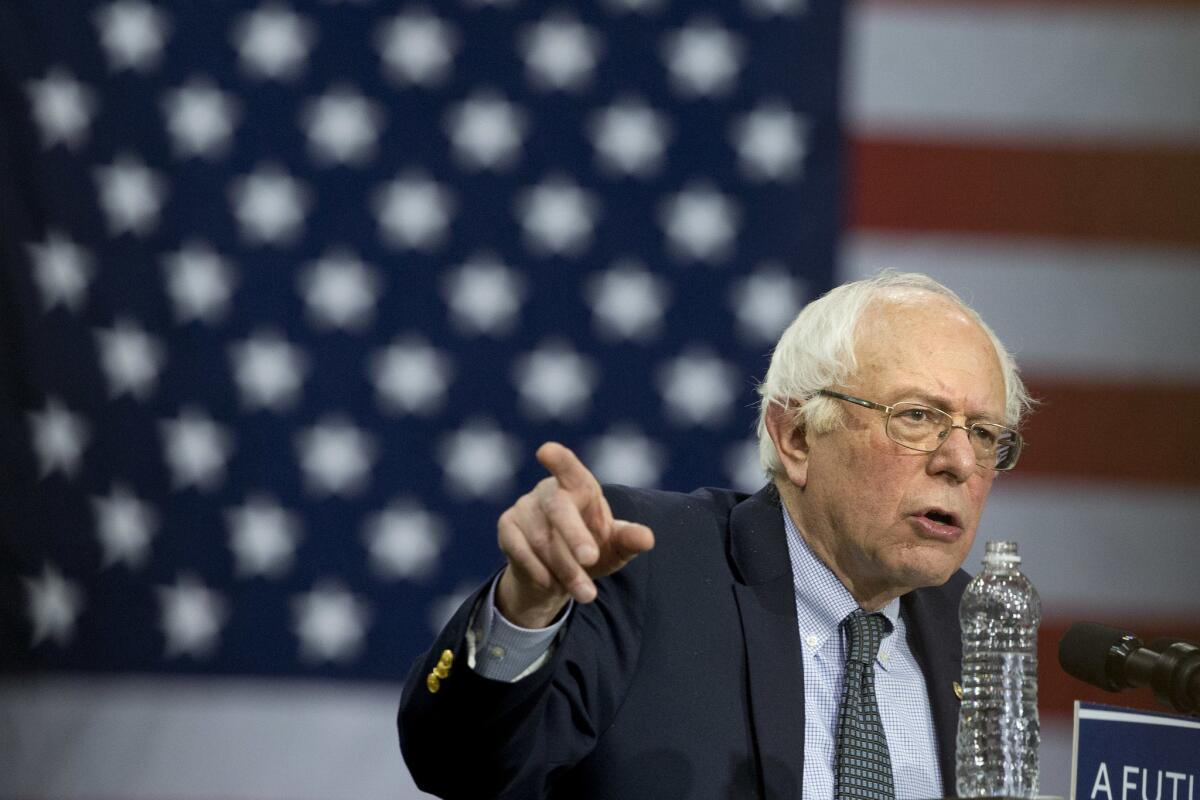South Carolina black voters say they know Hillary Clinton well enough to pass on Bernie Sanders

Democratic presidential candidate Bernie Sanders campaigns in Chicago.
- Share via
Reporting from Charleston, S.C. — His hands caked in grime from his repair job, Walter Brown coughed out a laugh when asked for his thoughts about Bernie Sanders, whose insurgent presidential campaign has electrified liberals around the country.
“Who is Bernie Sanders?” he said while sitting on a bench during an afternoon break. Brown, 59, is already leaning toward Hillary Clinton and doesn’t plan to start researching other options.
“I don’t have time,” he said, gesturing toward the downtown building where he’s been working. “I’m here all day.”
Sanders’ effort to broaden his appeal beyond white progressives and young people has run into a roadblock here in the form of black working-class voters, who in interviews here this week repeatedly voiced their longtime loyalty to Clinton. Several echoed Brown’s point that they don’t have time to explore an alternative nor interest in learning about Sanders, a U.S. senator from Vermont who was practically unknown in South Carolina before launching his presidential bid.
Join the conversation on Facebook >>
“She has a three-decade head start,” said Gibbs Knotts, chairman of the political science department at the College of Charleston. “It’s hard for Sanders to make up that kind of ground in a pretty short period of time.”
About half of the electorate in South Carolina’s Democratic primary is black, and polls show Clinton leading the group with a wide margin. Thirty-one percent of blacks who are likely to vote in the primary said they didn’t have an opinion about Sanders – more than twice the number for Clinton, according to a Monmouth University poll released this month.
Alberta Ross, 77, says she doesn’t know anyone at the church around the corner from her house in North Charleston who is voting for Sanders, and she doesn’t know much about him either.
“I’m not up on all of them,” she said. “I’m just up on the one I want” – meaning Clinton – “and the one I don’t” – meaning Donald Trump, the Republican front-runner.
Such unfamiliarity with Sanders is a potential roadblock for him not only here in South Carolina but also with black voters in other states, even though he’s cut deeply into Clinton’s backing among the young and the white.
Besides Clinton’s strong name recognition, political observers see other reasons for Sanders’ trouble. His approach to economic issues doesn’t always mesh with how many working-class black voters view the country, said Scott Huffmon, a political science professor who runs Winthrop University’s polling operation.
“When you’re talking about the message of income inequality … most of them see it as a racial issue,” he said. “Income inequality has been a secondary issue to racial inequality.”
Sanders has long been outspoken about racism, participating in the March on Washington in 1963 and getting arrested for protesting housing segregation that same year while a student at the University of Chicago. He has repeatedly called for changes in the criminal justice system and touts his low rating from the National Rifle Assn. as proof of his stance against gun violence.
But black voters in South Carolina are more likely to trust Clinton on issues related to their communities, the Monmouth poll showed, and the Charleston area has seen some of the country’s most painful racial episodes over the last year.
First, an unarmed black man was shot to death by a white North Charleston police officer while running away from a traffic stop. Then a young white man massacred nine black parishioners in a racially motivated shooting in the Emanuel African Methodist Episcopal Church in Charleston.
It’s in these situations, where the candidates’ messages are similar, when the power of Clinton’s long track record becomes most evident.
TRAIL GUIDE: All the latest news on the 2016 presidential campaign >>
“Even if Bernie’s message is exactly the same, Clinton comes through on an uncluttered channel,” Huffmon said. “With Bernie, it’s, ‘Who is this again?’”
For many black voters, warm feelings about Clinton are tied to their affection for her husband.
“There’s a history between African Americans and the Clintons,” said Carneal McCoy, 52, of North Charleston. McCoy, a restaurant cook, said “there were a lot of good times” when Bill Clinton was president, and he was considered “an honorary black man.”
Some black voters are skeptical of how Sanders would accomplish his ambitious liberal agenda, especially since President Obama was stymied so often by a Republican-controlled Congress.
“I know Bernie wants to do a lot. But are those things going to get accomplished?” said Arnold Jenkins, 52, a corrections officer.
“I don’t want to say he’s a snake oil salesman,” he said. “But he’s telling people what they want to hear.”
Sanders has been rallying with black celebrities to try to close the gap as much as possible in South Carolina.
Movie director Spike Lee recorded a radio spot that riffs on a monologue from his classic film about racial tension in Brooklyn, “Do the Right Thing.” And actor Danny Glover, best known for the “Lethal Weapon” series, is campaigning for Sanders.
Glover was at a field office in a Charleston strip mall on Monday, and he worked up a sweat rallying the candidate’s volunteers.
One potential black supporter who walked in the door, Troy White, said he was disappointed in Clinton’s support for strict criminal justice policies in the 1990s that increased the incarceration rate among minorities.
White, 41, says he’s not sure whom he wants to vote for now.
“I’m curious about Bernie,” he said.
But in the Charleston area, there’s not that many black voters who are still curious.
Outside in the parking lot, James Brown, 76, was leaving a store and walking to his car. He said he’s voting for Clinton.
“I got nothing against him,” he said of Sanders. “I don’t know that much about him.”
Twitter: @chrismegerian
ALSO
Delegate tracker: Who’s winning the race to the nomination?
Desperate towel-snapping as GOP candidates try to take down Trump
To reach minority voters, Clinton talks white privilege. Sanders has another way...
More to Read
Get the L.A. Times Politics newsletter
Deeply reported insights into legislation, politics and policy from Sacramento, Washington and beyond. In your inbox three times per week.
You may occasionally receive promotional content from the Los Angeles Times.









